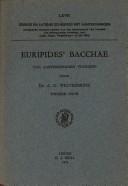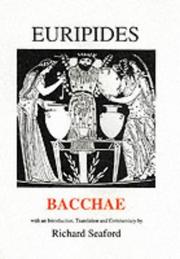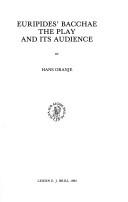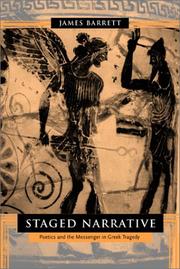| Listing 1 - 10 of 10 |
Sort by
|

ISBN: 9789004036857 9789004672901 Year: 1973 Publisher: Leiden ; Boston : Brill
Abstract | Keywords | Export | Availability | Bookmark
 Loading...
Loading...Choose an application
- Reference Manager
- EndNote
- RefWorks (Direct export to RefWorks)
Book
ISBN: 1405175788 9781405175784 1118609751 1118609778 1118609786 1306140862 Year: 2014 Publisher: Hoboken Wiley-Blackwell
Abstract | Keywords | Export | Availability | Bookmark
 Loading...
Loading...Choose an application
- Reference Manager
- EndNote
- RefWorks (Direct export to RefWorks)
Aufführung. --- Globalisierung. --- Greek drama --- Modern presentation. --- Euripides, --- Euripides. --- Bacchae (Euripides). --- Euripides. - Bacchae

ISBN: 0856686093 9780856686092 Year: 2011 Publisher: Warminster, England : Aris & Phillips,
Abstract | Keywords | Export | Availability | Bookmark
 Loading...
Loading...Choose an application
- Reference Manager
- EndNote
- RefWorks (Direct export to RefWorks)
Bacchantes --- Pentheus (Greek mythology) --- Drame satyrique grec. --- Bacchae. --- Dionysus (Greek deity) --- Euripides.

ISBN: 8815113177 9788815113177 Year: 2006 Publisher: Bologna: Il Mulino,
Abstract | Keywords | Export | Availability | Bookmark
 Loading...
Loading...Choose an application
- Reference Manager
- EndNote
- RefWorks (Direct export to RefWorks)
Dionysus (Greek deity) in literature --- Dionysus (Greek deity) --- Euripides --- Euripides. - Bacchae
Book
ISBN: 1108948383 1108844553 9781108948388 9781108844550 Year: 2024 Publisher: Cambridge: New York, NY: Cambridge University Press,
Abstract | Keywords | Export | Availability | Bookmark
 Loading...
Loading...Choose an application
- Reference Manager
- EndNote
- RefWorks (Direct export to RefWorks)
"The Bacchae is an exceptionally important and influential Classical text: it is one of the most widely read and performed Greek tragedies and the text that is perhaps most formative of modern ideas of Greek religion as a whole"--
Book
ISBN: 0823255689 0823261204 0823255697 0823255670 9780823255696 9780823255689 9780823255672 9780823255658 9780823255665 0823255654 0823255662 Year: 2014 Publisher: New York
Abstract | Keywords | Export | Availability | Bookmark
 Loading...
Loading...Choose an application
- Reference Manager
- EndNote
- RefWorks (Direct export to RefWorks)
Today we urgently need to reevaluate the human place in the world in relation to other animals. This book puts Maurice Merleau-Ponty’s philosophy into dialogue with literature, evolutionary biology, and animal studies. In a radical departure from most critical animal studies, it argues for evolutionary continuity between human cultural and linguistic behaviors and the semiotic activities of other animals.In his late work, Derrida complained of philosophers who denied that animals possessed such faculties, but he never investigated the wealth of scientific studies of actual animal behavior. Most animal studies theorists still fail to do this. Yet more than fifty years ago, Merleau-Ponty carefully examined the philosophical consequences of scientific animal studies, with profound implications for human language and culture. For him, “animality is the logos of the sensible world: an incorporated meaning.” Human being is inseparable from animality.This book differs from other studies of Merleau-Ponty by emphasizing his lifelong attention to science. It shows how his attention to evolutionary biology and ethology anticipated recent studies of animal cognition, culture, and communication.
Merleau-Ponty, Maurice, --- Bacchae. --- Gilgamesh. --- Life of Pi. --- Meleau_Ponty. --- animal studies. --- animality. --- animals and culture. --- animals. --- human evolution. --- language.
Book
ISBN: 9781905670130 1905670133 Year: 2007 Volume: 99 Publisher: London : Institute of Classical Studies, School of advanced study, University of London,
Abstract | Keywords | Export | Availability | Bookmark
 Loading...
Loading...Choose an application
- Reference Manager
- EndNote
- RefWorks (Direct export to RefWorks)
Bacchantes in literature. --- Greek drama (Tragedy) --- Bacchantes dans la littérature --- Tragédie grecque --- History and criticism. --- Histoire et critique --- Euripides. --- Characters. --- Self in literature --- History and criticism --- Euripides --- Criticism and interpretation --- Bacchantes dans la littérature --- Tragédie grecque --- Greek drama (Tragedy) - History and criticism --- Euripides - Criticism and interpretation --- Euripides. - Bacchae

ISBN: 9004070117 900432805X 9789004070110 Year: 1984 Volume: 78 Publisher: Leiden
Abstract | Keywords | Export | Availability | Bookmark
 Loading...
Loading...Choose an application
- Reference Manager
- EndNote
- RefWorks (Direct export to RefWorks)
The purpose of this book is to investigate what it was Euripides intended to convey to the theatre-going public of his day when he wrote his most exciting and most gruesome play, the Bacchae . The meanings which are to be attached to the action of a play are woven by an audience, both during and after the performance, into a single dramatic experience, labelled in this book as 'audience response'. After some introductory chapters dealing with the history of the interpretation of the Bacchae and with the theory of audience response, the main part of the book is devoted to a detailed analysis of the action of the play (chapters 4 and 5), and to a study of Dionysus in his various apects in Athenian life and in his appearances in earlier literature and on the tragic stage. The discussion of the choruses concentrates on the choruses' repeated utterances about cleverness and wisdom, which form the core of the Dionysian propaganda of the play. The most immediate results of this new interpretation of the Bacchae are that the widely-accepted view of Pentheus as a dark puritan, a man possessed by the Dionysian qualities of his divine opponent, proves to be untenable, and that that which in the past has been rightly called the overriding theme of the play - the god's epiphany - also contains the poet's most serious and ironical discussion of divinity and of man's treatment of it. The problems of the Greek text are given full discussion, mainly in the nots and appendices. In many cases new solutions are proposed; some new problems are however added.
Euripides --- Dionysos (Divinité grecque) dans la littérature --- Dionysus (Greek deity) in literature --- Dionysus (Griekse godheid) in de literatuur --- Greek drama (Tragedy) --- Bacchantes in literature --- Theater audiences --- Pentheus (Greek mythology) in literature --- Tragédie grecque --- Bacchantes dans la littérature --- Théâtre --- Penthée (Mythologie grecque) dans la littérature --- History and criticism --- History --- Histoire et critique --- Publics --- Histoire --- Euripides. --- Theater --- Pentheus, --- In literature --- -Theater audiences --- -Audiences, Theater --- Theatergoers --- Performing arts --- Theater attendance --- Dramatics --- Histrionics --- Professional theater --- Stage --- Theatre --- Acting --- Actors --- -Audiences --- Audiences --- -History --- -Euripides --- Euripide --- Tragédie grecque --- Bacchantes dans la littérature --- Dionysos (Divinité grecque) dans la littérature --- Théâtre --- Penthée (Mythologie grecque) dans la littérature --- Audiences, Theater --- Dionysus --- In literature. --- Bacchantes in literature. --- Literature. --- Theater. --- Theater audiences. --- Belles-lettres --- Western literature (Western countries) --- World literature --- Authors --- Authorship --- Penthée, --- Tentheus, --- Bacchus --- Bakchos --- Dionís --- Dionisas --- Dioniso --- Dionīss --- Dionisu --- Dioniz --- Dionizi --- Dionizo --- Dionizos --- Dionüszosz --- Dionysos --- Dionýzos --- Diyonizosse --- Πενθεύς, --- Τενθεύς, --- Διόνυσος --- Дионис --- ديونيسوس --- 디오니소스 --- דיוניסוס --- ディオニューソス --- 狄俄倪索斯 --- Βάκχος --- Діоніс --- Bacchae (Euripides) --- Bacchantes (Euripides) --- To 1500 --- Greece. --- al-Yūnān --- Ancient Greece --- Ellada --- Ellas --- Ellēnikē Dēmokratia --- Elliniki Dimokratia --- Grčija --- Grèce --- Grecia --- Gret͡sii͡ --- Griechenland --- Hellada --- Hellas --- Hellenic Republic --- Hellēnikē Dēmokratia --- Kingdom of Greece --- République hellénique --- Royaume de Grèce --- Vasileion tēs Hellados --- Xila --- Yaṿan --- Yūnān --- Philology --- Theater - History - To 500 --- Euripides - Bacchae --- Pentheus, - King of Thebes (Mythological character) - In literature --- Pentheus, - King of Thebes (Mythological character)

ISBN: 0520231805 0520927931 9786612356582 1282356585 159734916X 9780520927933 0585419647 9780585419640 9780520231801 9781597349161 6612356588 9781282356580 Year: 2002 Publisher: Berkeley University of California Press
Abstract | Keywords | Export | Availability | Bookmark
 Loading...
Loading...Choose an application
- Reference Manager
- EndNote
- RefWorks (Direct export to RefWorks)
The messenger who reports important action that has occurred offstage is a familiar inhabitant of Greek tragedy. A messenger informs us about the death of Jocasta and the blinding of Oedipus, the madness of Heracles, the slaughter of Aigisthos, and the death of Hippolytus, among other important events. Despite its prevalence, this conventional figure remains only little understood. Combining several critical approaches-narrative theory, genre study, and rhetorical analysis-this lucid study develops a synthetic view of the messenger of Greek tragedy, showing how this role illuminates some of the genre's most persistent concerns, especially those relating to language, knowledge, and the workings of tragic theater itself. James Barrett gives close readings of several plays including Aeschylus's Persians, Sophocles' Electra and Oedipus Tyrannus, and Euripides' Bacchae and Rhesos. He traces the literary ancestry of the tragic messenger, showing that the messenger's narrative constitutes an unexplored site of engagement with Homeric epic, and that the role illuminates fifth-century b.c. experimentation with modes of speech. Breaking new ground in the study of Athenian tragedy, Barrett deepens our understanding of many central texts and of a form of theater that highlights the fragility and limits of human knowledge, a theme explored by its use of the messenger.
Greek drama (Tragedy) --- Messengers in literature. --- Narration (Rhetoric) --- Rhetoric, Ancient. --- History and criticism. --- History --- -Messengers in literature --- Rhetoric, Ancient --- Classical languages --- Greek language --- Greek rhetoric --- Latin language --- Latin rhetoric --- Narrative (Rhetoric) --- Narrative writing --- Rhetoric --- Discourse analysis, Narrative --- Narratees (Rhetoric) --- History and criticism --- Tragédie grecque --- Messagers dans la littérature --- Narration --- Rhétorique ancienne --- Histoire et critique --- Ancient rhetoric --- Messengers in literature --- achilles. --- aeschylus. --- ancient greece. --- ancient world. --- arete. --- athenian tragedy. --- bacchae. --- classicism. --- drama. --- electra. --- epic. --- epistemology. --- euripides. --- genre study. --- gods and goddesses. --- greek tragedy. --- hellenism. --- homer. --- homeric epic. --- hubris. --- human knowledge. --- literary ancestry. --- literary criticism. --- literature. --- messenger. --- mythology. --- narrative poetics. --- narrative theory. --- nonfiction. --- oedipus rex. --- oedipus tyrannus. --- oedipus. --- performing arts. --- persians. --- poetry. --- rhesos. --- rhetoric. --- rhetorical analysis. --- sophocles. --- theater. --- tragedy. --- tragic messenger.
Book
ISBN: 9780691215662 0691215669 9780691222875 0691222878 Year: 2022 Publisher: Princeton, New Jersey : Princeton University Press,
Abstract | Keywords | Export | Availability | Bookmark
 Loading...
Loading...Choose an application
- Reference Manager
- EndNote
- RefWorks (Direct export to RefWorks)
In 1346, a catastrophic plague beset Europe and its neighbours. The Black Death was a human tragedy that abruptly halved entire populations and caused untold suffering, but it also brought about a cultural and economic renewal on a scale never before witnessed. The World the Plague Made is a panoramic history of how the bubonic plague revolutionized labour, trade, and technology and set the stage for Europe's global expansion.0James Belich takes readers across centuries and continents to shed new light on one of history's greatest paradoxes. Why did Europe's dramatic rise begin in the wake of the Black Death? Belich shows how plague doubled the per capita endowment of everything even as it decimated the population. Many more people had disposable incomes. Demand grew for silks, sugar, spices, furs, gold, and slaves. Europe expanded to satisfy that demand-and plague provided the means. Labour scarcity drove more use of waterpower, wind power, and gunpowder. Technologies like water-powered blast furnaces, heavily gunned galleons, and musketry were fast-tracked by plague. A new "crew culture" of "disposable males" emerged to man the guns and galleons.0Setting the rise of Western Europe in global context, Belich demonstrates how the mighty empires of the Middle East and Russia also flourished after the plague, and how European expansion was deeply entangled with the Chinese and other peoples throughout the world.
Black Death. --- 476-1492. --- Europe --- Europe. --- History --- History of Europe --- anno 1300-1399 --- anno 1400-1499 --- anno 1500-1599 --- Epidemics --- Medicine, Medieval --- Plague --- Peste noire. --- 476-1492 --- Council of Europe countries --- Eastern Hemisphere --- Eurasia --- Northern Europe --- Southern Europe --- Western Europe --- Abolitionism. --- Adultery. --- Amor Vincit Omnia (Caravaggio). --- Antonine Plague. --- Black rat. --- Bribery. --- Bruges. --- Bubonic plague. --- Burnt Norton. --- Child mortality. --- Cinque Ports. --- Civil war. --- Colonialism. --- Communism. --- Contraband. --- Coromandel Coast. --- Corruption in India. --- Cossack host. --- Death. --- Debasement. --- Devaluation. --- Disaster. --- Disease. --- Edward VIII. --- Enfilade and defilade. --- Epidemic. --- Euboea. --- Eunuch. --- Eurasia. --- Extortion. --- Funeral Blues. --- Greek tragedy. --- Habitat destruction. --- Harry Ransom Center. --- Idiosyncrasy. --- Indian Ocean. --- Industrialisation. --- Infection. --- Inflation. --- Influenza. --- Institution. --- Journey to a War. --- London. --- Lübeck. --- Maghreb. --- Malaria. --- Mamluk Sultanate (Cairo). --- Mamluk. --- Marxism. --- Massacre of the Innocents. --- Measles. --- Mortal sin. --- Mughal Empire. --- Muhammad. --- Nawabs of Bengal and Murshidabad. --- Ottoman Empire. --- Outbreak. --- Pamphlet. --- Pandemic. --- Pathogen. --- Peasant. --- Persecution. --- Phrygia. --- Plague (disease). --- Plague of Justinian. --- Plague pit. --- Pneumonic plague. --- Poetry. --- Pogrom. --- Postal order. --- Privateer. --- Racism. --- Robin Skelton. --- Rodent. --- Safavid dynasty. --- Sapping. --- Second plague pandemic. --- Serfdom. --- Ship. --- Slash-and-burn. --- Smallpox. --- Smuggling. --- Spice trade. --- Stanza. --- Stephen Spender. --- Sumptuary law. --- Sylvatic plague. --- The Bacchae. --- Triangular trade. --- Typhoid fever. --- Typhus. --- Typographical error. --- War of succession. --- War. --- Warfare. --- World War I. --- World history. --- Yellow fever. --- Yersinia pestis.
| Listing 1 - 10 of 10 |
Sort by
|

 Search
Search Feedback
Feedback About UniCat
About UniCat  Help
Help News
News